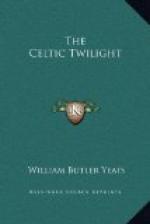1902.
THE SORCERERS
In Ireland we hear but little of the darker powers,[FN#4] and come across any who have seen them even more rarely, for the imagination of the people dwells rather upon the fantastic and capricious, and fantasy and caprice would lose the freedom which is their breath of life, were they to unite them either with evil or with good. And yet the wise are of opinion that wherever man is, the dark powers who would feed his rapacities are there too, no less than the bright beings who store their honey in the cells of his heart, and the twilight beings who flit hither and thither, and that they encompass him with a passionate and melancholy multitude. They hold, too, that he who by long desire or through accident of birth possesses the power of piercing into their hidden abode can see them there, those who were once men or women full of a terrible vehemence, and those who have never lived upon the earth, moving slowly and with a subtler malice. The dark powers cling about us, it is said, day and night, like bats upon an old tree; and that we do not hear more of them is merely because the darker kinds of magic have been but little practised. I have indeed come across very few persons in Ireland who try to communicate with evil powers, and the few I have met keep their purpose and practice wholly hidden from those among whom they live. They are mainly small clerks and the like, and meet for the purpose of their art in a room hung with black hangings. They would not admit me into this room, but finding me not altogether ignorant of the arcane science, showed gladly elsewhere what they would do. “Come to us,” said their leader, a clerk in a large flour-mill, “and we will show you spirits who will talk to you face to face, and in shapes as solid and heavy as our own.”
[FN#4] I know better now. We have the dark powers much more than I thought, but not as much as the Scottish, and yet I think the imagination of the people does dwell chiefly upon the fantastic and capricious.
I had been talking of the power of communicating in states of trance with the angelical and faery beings,—the children of the day and of the twilight—and he had been contending that we should only believe in what we can see and feel when in our ordinary everyday state of mind. “Yes,” I said, “I will come to you,” or some such words; “but I will not permit myself to become entranced, and will therefore know whether these shapes you talk of are any the more to be touched and felt by the ordinary senses than are those I talk of.” I was not denying the power of other beings to take upon themselves a clothing of mortal substance, but only that simple invocations, such as he spoke of, seemed unlikely to do more than cast the mind into trance, and thereby bring it into the presence of the powers of day, twilight, and darkness.
“But,” he said, “we have seen them move the furniture hither and thither, and they go at our bidding, and help or harm people who know nothing of them.” I am not giving the exact words, but as accurately as I can the substance of our talk.




